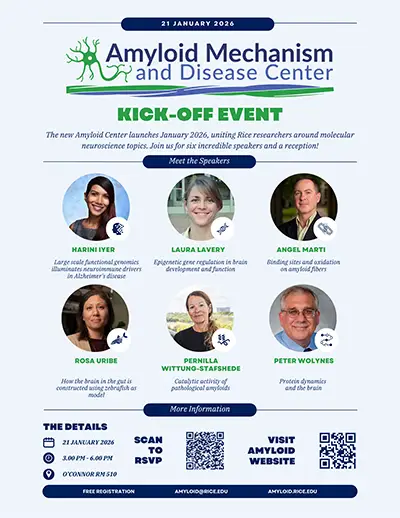Neuroscience Initiative at Rice University
The Neuroscience Initiative (NSI) brings together researchers across Rice University to better understand how the brain develops, functions, and changes over time. Our goal is to connect scientists, support collaboration, and accelerate breakthroughs that can improve human health.
Our Focus
We seek answers to some of the most important questions in brain science:
- How does the brain form and adapt throughout life?
- How are memories stored?
- What causes neurodegenerative diseases such as Alzheimer’s, Parkinson’s, ALS, and Huntington’s?
- How do genetic, environmental, and cellular factors contribute to neurodevelopmental conditions such as autism, epilepsy, and intellectual disabilities?
To tackle these challenges, we combine expertise from molecules to whole organisms, and from theory and computation to advanced experimental methods.
Why This Work Matters
Neurodegenerative and neurodevelopmental disorders are increasing worldwide. For example, by 2050, nearly 130 million people globally are expected to be living with dementia, and we currently have no cures. Understanding the fundamental biology of the brain—how it develops, how it functions, and how it breaks down—is essential for developing new treatments.
Our Approach
The NSI unites faculty from Biosciences, Chemistry, Physics, and several interdisciplinary research centers at Rice, with strong partnerships across the Texas Medical Center. By working together, we aim to:
- Support collaborative research and seed funding
- Grow cross-disciplinary training for graduate students and postdocs
- Share cutting-edge equipment and resources
- Host seminars, workshops, conferences, and visiting scientists
- Expand outreach and mentorship opportunities
- Build a strong community for neuroscience at Rice
A New Area of Emphasis: Amyloid Biology
A key focus emerging from our neuroscience community is the study of amyloids, proteins that can accumulate in the brain and are linked to both normal physiology and diseases like Alzheimer’s. The central theme of amyloid biology and mechanism helps to bridge our research on brain development, function, and degeneration.
To get the neuroscience community together and build synergy, we are establishing the new Amyloid Mechanism and Disease Center. Join us for the official From Molecules to Mind Kick-Off event on January 21, 2026 to celebrate the launch of the new center.
Please visit the new AMDC website for more details about the initiative, Kick-Off event, and to subscribe to be on the mailing list for ongoing updates.
What’s Next
In 2026, we will launch:
- A public seminar series and internal colloquium series
- A new Texas-wide Amyloid Research Conference

